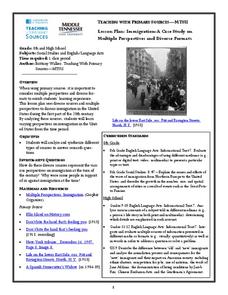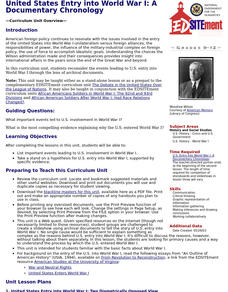City University of New York
Jim Crow and the Fight for Civil Rights
The history of voting rights in America has always been rocky, especially in the time period after the Civil War. Learn about the ways that Jim Crow laws affected the voting rights of African Americans with a lesson featuring primary...
Curated OER
A Lesson To Accompany "The First Bank of the United States: A Chapter in the History of Central Banking"
Here is an interesting topic. Learners examine the economics that led to the founding of the First Bank of America. They participate in a reader's theater experience depicting the debate between Alexander Hamilton and Thomas Jefferson...
Middle Tennessee State University
Lesson Plan: Immigration: A Case Study on Multiple Perspectives and Diverse Formats
As part of a case study of U.S. immigration during the first part of the 20th century, class members examine a variety of primary sources that present multiple perspectives of the responses of those in favor of immigration and those...
Mrs. Robbins' Social Studies Site
The Berlin Blockade
The Berlin Blockade may not take up as much space in the history books as other events of the Cold War, but for the citizens of west Berlin in 1948—and the events to follow between the Soviet Union and the United Stattes—those 318 days...
Wells Fargo
Wells Fargo History Museum: Curriculum Guide
Learn about the California Gold Rush from an institution that has been in place since the early days of the American West: Wells Fargo History Museum. From domain-specific vocabulary review to group research projects, an expansive packet...
NPR
The History of America’s Weed Laws
To understand the laws regarding marijuana use in the United States, you can go all the way back to the 1800's to learn about farming hemp, or you can go back to 2018 when California became the sixth state to legalize recreational...
Facing History and Ourselves
Decision-Making: Introduction to the Unit
Make your classroom a supportive and communicative place to be before beginning a unit on the Holocaust. Working together as a class, learners reflect on their previous experiences of classroom discussions before establishing a...
Encyclopedia Britannica
Meta-Study: Political Brains
Are there differences in the brains of liberals and conservatives? That is the question young political scientists are challenged to answer. Class members examine studies, consider how the results are presented, and how the studies were...
Teaching Tolerance
Using Photographs to Teach Social Justice | Exploring Identity
Even without captions, photographs can tell amazing, involved, and complex stories. Viewers analyze two photos, consider what the pictures reveal about the subjects' identity, and determine the social justice issues represented in the...
Teaching Tolerance
Using Photographs to Teach Social Justice | Legal Action: The Supreme Court
A social justice lesson focuses on the Supreme Court case Loving v. Virginia which struck down laws that prohibited marriages between African Americans and white Americans. The lesson begins with class members examining a photograph of...
Teaching Tolerance
Mass Incarceration as a Form of Racialized Social Control
Mass incarceration: A result of a tough stance on crime or racial discrimination, you decide. Academics explore the history and reasons behind mass incarcerations in the United States and its impact on ethnic communities. The...
Teaching Tolerance
Using Photographs to Teach Social Justice | Confronting Unjust Laws
The right to peacefully assembly to protest injustice is a key element of the First Amendment to the United States Constitution. Class members are asked to analyze two photographs of people confronting what they consider to be unjust...
Humanities Texas
A President's Vision: George Washington
Who knew that one poster about George Washington could have so many learning possibilities attached to it? Here you'll find an attractive learning display on the first president of the United States, as well as worksheets and...
Curated OER
4th Grade Social Studies
In this social studies worksheet, 4th graders answer multiple choice questions about colonies, the Revolutionary War, geography, and more. Students complete 25 questions.
Curated OER
United Nations: What It Does for Us
Fifth graders will understand what the United Nations Organization does and will be able to identify the aims and purposes of the United Nations. They recognize the seven key areas of the Millennium Declaration.
Curated OER
The United States and Canada
While just a short review of some simple facts about the United States and Canada, this could be a useful resource for an introduction to North America. Teachers could use this as a model for student projects or could add more...
Constitutional Rights Foundation
Arizona v. United States — States and Immigration Law
As part of a study of immigration law, class members read a summary of the Supreme Court case, Arizona v. United States. They then examine a series of examples and acting as federal court judges, must determine if the scenarios meet the...
C-SPAN
The Impact of Citizens United v. FEC
What began as an effort to show a movie by an interest group has impacted financing of federal elections. Did the Citizens United case lead to more "dark money" in politics, or did it shine a light with more speech? Using video clips...
Center for Civic Education
What Basic Ideas About Government Are Included in the Preamble to the Constitution?
Young historians explore the meaning of the Preamble to the US Constitution in this upper-elementary social studies lesson. Working with partners or in small groups, children discuss the purpose of government before reading and analyzing...
Historical Thinking Matters
Social Security: 1 Day Lesson
Should the United States provide relief for those who are unemployed? Trace this question back to the Great Depression with your young historians, who will engage in careful reading of historical documents and classroom discussion to...
Mikva Challenge
Why Vote?
Elections are supposed to represent the will of the people. So why don't 100% of registered voters line up at the polls on Election Day? High schoolers study the last few elections and the voter turnout for each, according to race,...
Australian Human Rights Commission
Introduction to the Universal Declaration of Human Rights
Human rights became a global focus after decades of war, recovery from war, and uncountable war crimes committed throughout. Social studies class members discuss the Universal Declaration of Human Rights before completing an interactive...
Boys Town
More Tools for Teaching Social Skills in School
Put an end to wasted instructional time with this lesson on responsibility and preparedness. After completing this series of activities students will learn the importance of these social skills not only in the classroom, but at home and...
Curated OER
United States Entry into World War I: A Documentary Chronology
Students complete a unit of lessons on the events that led to U.S. involvement in WWI. They complete a Webquest, conduct research, complete a Venn diagram, read and discuss the reasons for entering the war, and create a slideshow.
Other popular searches
- Social Studies Unit Plans
- Thematic Social Studies Units
- Unit Plan Social Studies
- Alberta Social Studies Units
- Thematic Unit Social Studies
- Unit Planning Social Studies
- Social Studies 11 Unit 6

























